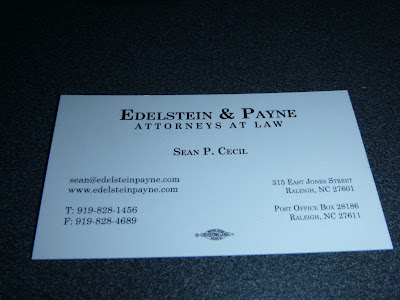NC Criminal Law: Appellate Court Rules Search Warrant Invalid (Originally Posted by Sean Cecil Jan 13, 2016)
- Get link
- X
- Other Apps
https://edelsteinpayne.com/criminal-defense
NC Criminal Law: Appellate Court Rules Search Warrant Invalid
Originally Posted by Sean Cecil Jan 13, 2016 (0 Comments)
The so-called "war on drugs" is an abject failure. I am particularly interested in defending crimes involving allegations of illegal possession, production, or distribution of controlled substances, especially criminal allegations regarding cannabis. That's one reason I am particularly enthusiastic about last week's ruling in State v. Allman, in which the North Carolina Court of Appeals ruled that a search warrant for drugs was not valid because it was not supported by probable cause to believe there was drug activity at the residence indicated in the law enforcement application. The New Hanover County deputy sheriff (Bacon) who applied for the warrant knew that drug activity was occurring elsewhere, and extrapolated that information to obtain a warrant to search the home where the suspects lived with other people.
A search warrant is required unless some other exception to the 4th Amendment or state-guaranteed right of privacy applies. A search warrant is issued by a judicial officer, and must be supported by probable cause, typically established by a law enforcement officer's affidavit detailing the evidence the officer believes will be found in a particular place and why. Probable cause cannot be shown by conclusory affidavits stating only the belief of the affiant or an informer that probable cause exists to issue a warrant. In Allman, the Deputy alleged the following facts in support of his application for a search warrant: he was told by a Brunswick County deputy that the deputy had stopped two brothers in a vehicle and found 8+ ounces of marijuana and some cash. One of the brothers told the deputy that he kept some pot in his car at home so his mother wouldn't know about it. Also, one of the brothers owned two cell phones, one of which contained texts related to sale of marijuana. Deputy Bacon also included descriptions of the brothers' prior criminal history and the typical laundry list of things he often sees people involved in drug activity do, and other things he knows based upon his training and experience. Bacon obtained a search warrant for the address listed as the brothers' home, and when he went to serve it learned that the mother lived there but the brothers did not and the described car was not there. Mom told him where the young men actually lived, explained that they use her home as a mailing address, that they have a roommate at the other address, and described two cars they would find there. Among other things, Bacon swore in his affidavit in support of the search warrant application that drug dealers often use false addresses and lie to cops to hide their illegal drug activities.
Sheriff deputies found a bunch of drugs when they executed the warrant issued for the second home. However, the trial court suppressed the evidence found there, ruling that the search warrant affidavit did not establish probable cause to search because it did not establish a connection between the second house and the drugs that were supposedly there (and in fact were- or else there would have never been a case). The court rejected the state's argument that there was evidence that the brother's were engaged in drug dealing, citing precedential caselaw that evidence of drug dealing alone was insufficient to support a search warrant of a resident, and noting that there was no actual evidence linking the home to drug activity (the brother had admitted keeping drugs in a car at his mom's house at a different address.) The Court of Appeals also rejected prosecutor arguments that relied upon federal caselaw, noting that when federal appellant cases can't control when they conflict with North Carolina law. The courted that "nothing in Detective Bacon's application and affidavit indicated that he observed or received information that drugs were possessed or sold at the (second) residence," rejecting the state's argument that a "natural and reasonable inference" supported such an assumption.
Decisions to suppress evidence are among the toughest a judge can make, in part because they are suppressing direct evidence of guilt. That is especially true when the search that revealed the contraband was supported by a warrant- essentially a court has to decide that another judicial officer made an error in deciding there was probable cause. However, suppressing evidence in favor of guilty people protects the rights of us all, because the innocent do not often have the opportunity for judicial review of the circumstances of the fruitless search.
This case was decided 2-1, and the dissenting opinion may give rise to an effort by the state to seek review at the North Carolina Supreme Court.
Attorneys at Edelstein Payne & Lucas have experience litigating suppression motions and winning. If you have been searched and are facing or expecting criminal charges it is a good idea to seek counsel immediately!
______________________
If you, a co-worker, friend, neighbor, family member, or a loved one was injured on the job, please know we're here to help. We provide complimentary case evaluations for workplace accidents any where in the state of North Carolina
For Valuable Tips, Join us, Follow and Subscribe to Edelstein Payne:
Facebook:
Twitter:
Google+
Youtube:
Blogger:
Google Places:
Instagram:
Linkedin:
Pinterest:
Tumblr:
Yelp:
YP.com:
Civil Rights
Criminal Defense Lawyer
Edelstein Payne
Firefighter
M. Travis Payne
Migrant Farmworkers
Personal Injury
Sean Cecil
Vehicle wreck
Location:
315 E Jones St, Raleigh, NC 27601, USA
- Get link
- X
- Other Apps




Comments
Post a Comment